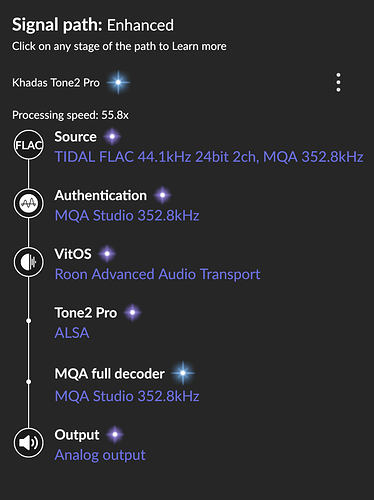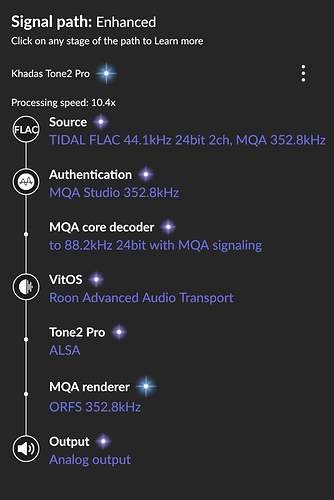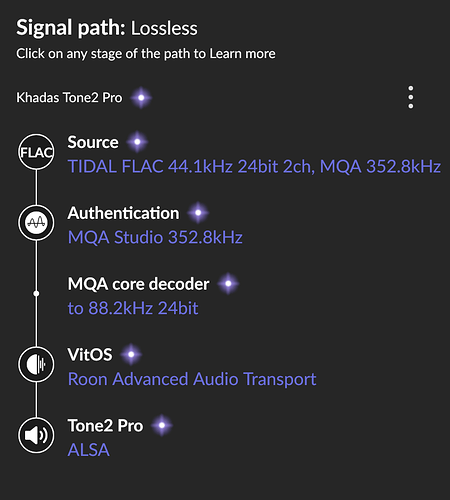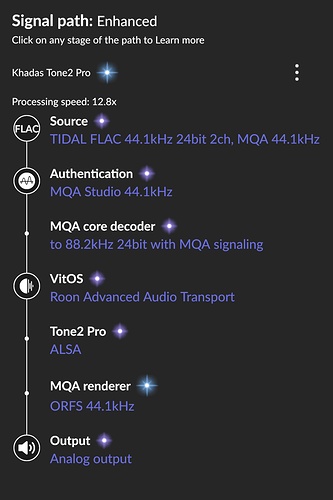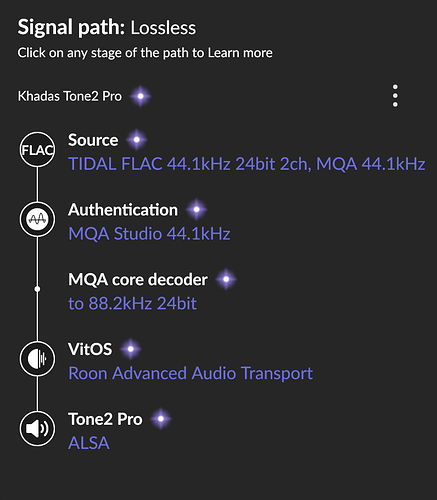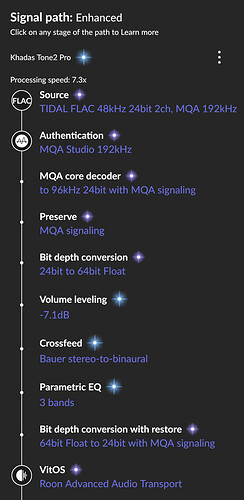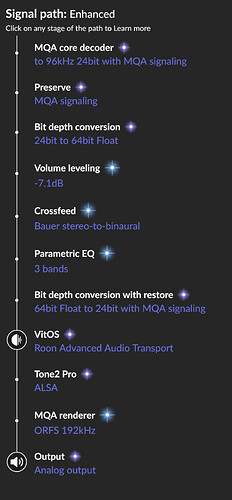Yes. Perhaps I can illustrate this is with some screenshots of Roon’s complete signal path with different tracks and settings. I’ll use a DAC that can function as an MQA Full Decoder or as a Renderer. I can simulate the behavior of less capable DACs by disabling some of these features in Roon’s settings.
Here’s the signal path when playing a 352.8 kHz MQA Studio Master to a DAC that is a full decoder:
Here, Roon Core authenticates the stream as “MQA Studio” and shows the original sampling rate of 352.8 kHz. It sends the 24-bit, 44.1 kHz stream from TIDAL, with no further processing, to the endpoint. The DAC then internally decodes the MQA 44.1 kHz stream to 88.2 kHz (in XMOS firmware) and completes subsequent unfolds, rendering it with a bandwidth of 352.8 kHz before converting to analog.
If I “lie” to Roon, telling it that this DAC is only an MQA Renderer, we get this signal path instead for the same track:
We see that Core is handling MQA authentication and Core Decoding. Note that the processing speed is slower now because of this extra work. Roon sends the decoded 88.2 kHz stream to the endpoint where the DAC internally completes the final unfolds, rendering as it did previously.
If I now tell Roon that the DAC has no MQA capabilities, we see this signal path:
As in the previous example, Core does MQA Authentication and Core Decoding. It sends the 88.2 kHz results of the first unfold to the endpoint without MQA Signaling since that would just be noise that a non-MQA DAC would be unable to process. The DAC converts the results to analog just as it would do for any 24-bit, 88.2 kHz PCM content.
As you can see, without an MQA DAC, you’re unable to enjoy the full 352.8 kHz bandwidth that was, supposedly, encoded into the original stream. The best you can do is 88.2 or 96 kHz, depending on the timebase used for encoding. I’m intentionally ignoring debate over the benefits (or not) of this extra bandwidth. 
Most new MQA content on TIDAL is encoded with lower sampling rates. Here, MQA offers no additional bandwidth, so I assume the only benefits come from temporal deblurring with hardware-specific filters internal to the DAC. If I play one of these tracks with the DAC configured as an MQA Renderer, we see this signal path:
Here, the DAC is correctly rendering the stream with the original sampling frequency of 44.1 kHz. However, if I send the same stream to a non-MQA DAC, we get this signal path instead:
Interesting, yes? The MQA DAC correctly renders this stream as 44.1 kHz while the non-MQA DAC gets an 88.2 kHz decoded stream from Core. Which is better? Well, the original encoding was at 44.1 kHz, so the correct results can only be achieved by decoding at 44.1 kHz. The non-MQA DAC is converting an 88.2 kHz stream, but there is no useful information included in the extra bandwidth.
Here’s where things get interesting. Roon Core can perform all sorts of useful DSP on signals before sending them to a low-power endpoint for playback. This is a fairly typical example for me:
Core is performing MQA Authentication and Core Decoding, volume leveling to a target of -16 LUFS, binaural crossfeed (for playback to headphones), and PEQ. It then restores MQA signaling so that the results can be properly rendered in hardware by a downstream MQA DAC. Here’s the bottom half of
Signal path:
The MQA DAC receives the 96 kHz decoded stream with MQA signaling from Core and renders at the original sampling rate of 192 kHz, unaware that the bits have been modified via DSP upstream. The benefits of hardware specific deblurring filters and whatever else MQA does remain fully intact.
From what I’ve read, MQA Core Decoding (the bit that Roon can do) delivers about 80% of the benefits of MQA, so if you don’t have an MQA DAC, you’re not missing out too much. But, to get full MQA functionality, including accurate decoding of the original sampling rate, you need an MQA DAC.
Hope this helps.
Disclaimer: I’m not convinced that MQA offers much in the way of real-world benefits, but it usually does not sound terrible. IMHO, sound quality comes down to mastering quality rather than delivery format. A Doug Sax or alan Yoshida master at 256 kbps MP3 sounds better to me than most of the DSD64 or 192 kHz PCM recordings out there.


 , zen stream seems a bit bass heavy -with the noname 12v PSU-
, zen stream seems a bit bass heavy -with the noname 12v PSU-